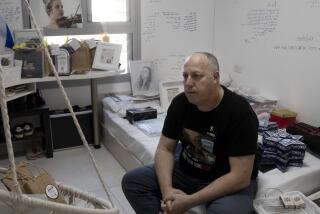A Voice Strong Enough for Heat of Israel Politics
- Share via
Chava Alberstein has been called “the Israeli Joan Baez,” and like Baez she has not shied from plunging into heated political issues.
A liberal advocate of a rapid, peaceful settlement of Israeli-Palestinian hostilities, Alberstein stirred outrage in 1989 with a striking version of the traditional Passover song, “Chad Gadya” (One Kid).
The song, as much a fixture of Jewish culture as “My Country ‘Tis of Thee” or “God Save the Queen” in the English-speaking world, relates symbolically the historical cycle of persecutors who devour the Jews, personified as a helpless kid, a baby goat. In the last stanza, God saves the little goat and ends the cycle of death.
Alberstein, delivering a charged performance with dark Medieval hues that call Loreena McKennitt to mind, changed the ending to reflect her horror at Israeli authorities’ tactics against the Palestinian uprising known as the Intifada.
Instead of being redeemed in the end, the Jews are seen as perpetuating the song’s cycle of oppression: “I used to be a kid and a peaceful sheep / Today I am a tiger and a ravenous wolf. . . . I don’t know who I am anymore.”
Alberstein said her “Chad Gadya” led to concert cancellations, calls for the song to be banned from radio and uncomfortable moments when she was out in public.
“There was a little atmosphere of violence,” she said. “I felt the beginning” of the extremist passions that exploded into fratricide with the 1996 assassination of peace-promoting Israeli prime minister Yitzhak Rabin.
“In the song, I was trying to say that if you enter this circle of violence, you will become violent yourself,” she said. “It is like a disease. The audience that came to my concerts really identified with it. It is [still] the strongest song of the evening” in her Israeli shows.
Times remain turbulent in Israel, and Alberstein is still in the fray. Her new release there, “I’ll Be Right Back,” includes songs criticizing conservative leader Benjamin Netanyahu and the Orthodox Rabbinic authorities who control religious life in Israel. She calls it “the most political album I ever wrote.”
More to Read
Sign up for Essential California
The most important California stories and recommendations in your inbox every morning.
You may occasionally receive promotional content from the Los Angeles Times.











